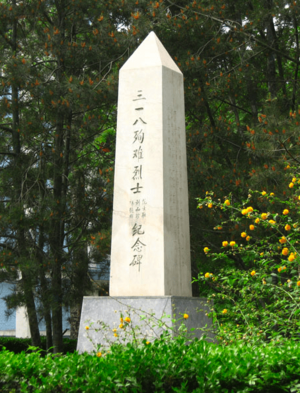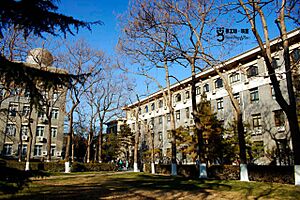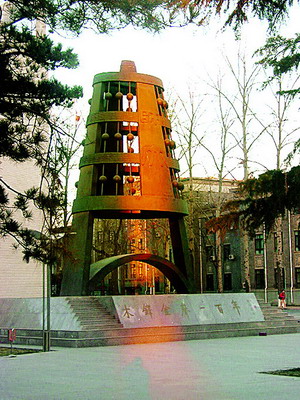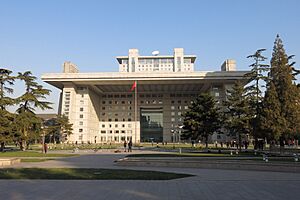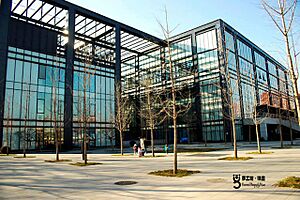Beijing Normal University facts for kids
|
北京师范大学
|
|||||||||||||||||||||||

Seal of Beijing Normal University
|
|||||||||||||||||||||||
| Latin: Universitas Normalis Pechinum | |||||||||||||||||||||||
| Motto | 学为人师、行为世范(Chinese) | ||||||||||||||||||||||
|---|---|---|---|---|---|---|---|---|---|---|---|---|---|---|---|---|---|---|---|---|---|---|---|
|
Motto in English
|
Learn, so as to instruct others; Act, to serve as example to all. | ||||||||||||||||||||||
| Type | Public | ||||||||||||||||||||||
| Established | 1902 | ||||||||||||||||||||||
| President | Yu Jihong | ||||||||||||||||||||||
| Party Secretary | Cheng Jianping | ||||||||||||||||||||||
|
Academic staff
|
2,606(2023) | ||||||||||||||||||||||
| Students | 31,896(2023) | ||||||||||||||||||||||
| Undergraduates | 15,961(2023) | ||||||||||||||||||||||
| Postgraduates | 15,935(2023) | ||||||||||||||||||||||
| Address | |||||||||||||||||||||||
| Campus | Beijing Campus:134 ha (330 acres) Zhuhai Campus:333 ha (820 acres) |
||||||||||||||||||||||
| Colours | Dark Blue Light Blue |
||||||||||||||||||||||
| Affiliations | BHUA, GHMUA | ||||||||||||||||||||||
| Chinese name | |||||||||||||||||||||||
| Simplified Chinese | 北京师范大学 | ||||||||||||||||||||||
| Traditional Chinese | 北京師範大學 | ||||||||||||||||||||||
|
|||||||||||||||||||||||
| Abbreviation | |||||||||||||||||||||||
| Chinese | 北师大 | ||||||||||||||||||||||
|
|||||||||||||||||||||||
Beijing Normal University (BNU) is a public university in Beijing, China. It works closely with China's Ministry of Education and the Beijing government. BNU is considered one of China's top universities, receiving special support from the government.
BNU started in 1902 as the Education Department of the Imperial University of Peking. It was the first place in China to train teachers at a university level. Over more than 100 years, BNU has grown into a major university. It is known for its strong programs in science, humanities, and especially for training future teachers.
BNU has two main locations: the Beijing Campus and the Zhuhai Campus. The university has many different departments, schools, and research centers. Its libraries hold over 5.4 million books and 8.2 million e-books.
The university works with about 300 universities and groups in over 40 countries. Each year, more than 900 international professors visit to teach and do research. BNU also has around 2000 international students who study there long-term. This makes it one of the most popular universities in China for international students.
Contents
University History
The university began as the Faculty of Education at the Imperial University of Peking in 1898. This university was founded by the Guangxu Emperor. In 1908, the Faculty of Education became its own school. It was called the "Imperial Capital School of Supreme Teacher Training." It then separated from the Imperial University of Peking, which later became Peking University.
In 1912, after the Republic of China was formed, the school changed its name to Peking Normal College. In 1920, it started offering programs for advanced degrees. In 1921, it began accepting female students. By 1923, it was renamed Peking Normal University. It was the first "normal university" in modern Chinese history. A "normal university" is a special kind of university that focuses on training teachers. In 1931, the Peking Women's College of Education joined Peking Normal University.
When the People's Republic of China was founded in 1949, Peking was renamed Beijing. The university then became Beijing Normal University. In 1952, Fu Jen Catholic University merged with Beijing Normal University. BNU moved to a new campus in 1954. In 1959, the Ministry of Education named BNU one of China's 20 most important national universities.
Historically, students at Beijing Normal University have been very active in important social movements. These include the May Fourth Movement in 1919. The New York Times has called BNU "one of the most progressive institutions" in China.
BNU Today
Beijing Normal University was chosen as a top institution in 1996. In 2002, BNU signed an agreement with the Ministry of Education and the Beijing government. This agreement gave BNU special support to become a "world-class" university.
In 2002, during its 100th birthday celebration, an asteroid discovered in 1996 was named 8050 Beishida after the university.
In 2006, the Chinese government started a new policy. It removed tuition fees for teacher training programs at six top universities, including BNU. This happened after Premier Wen Jiabao visited the university.
BNU works hard to make education fair for everyone. In 2009, 40% of its students were from western China. One-third were from rural areas, and one-quarter were from low-income families. More than 10% of students were from ethnic minority groups.
Academic Programs
As of 2020, Beijing Normal University offers many programs. It has 74 programs for undergraduate degrees, 185 for master's degrees, and 142 for doctoral degrees. Sixteen of these programs are considered "national key disciplines." This means they are recognized as some of the best in China.
| Top Programs at Beijing Normal University | |
|---|---|
| Education | Psychology |
| Chinese Language and Literature | Mathematics |
| Geography | Cell Biology |
| Marxist Philosophy | Physical Chemistry |
| Ancient Chinese History | System Sciences |
| Theory of History | Theoretical Physics |
| Folklore/Anthropology | Environmental Science |
| Ecology | Educational Economics and Management |
Beijing Normal University has 74 research laboratories. This includes 4 State Key Labs and many others supported by the Ministry of Education and Beijing Municipality. Key research centers focus on humanities, social sciences, engineering, and technology. The university also has a special institute for Proteomics, which studies proteins. This is the only one of its kind in a university by the Ministry of Education. The university also has a Science Park that covers 6 hectares.
| State Key Laboratories at Beijing Normal University |
|---|
| State Key Laboratory of Cognitive Neuroscience and Learning |
| State Key Laboratory of Earth Surface Processes and Resource Ecology |
| State Key Joint Laboratory of Environmental Simulation and Pollution Control |
| State Key Joint Laboratory of Remote Sensing Science |
BNU's yearly budget for science research is over 100 million Chinese Yuan. In 2010, 150 projects received funding from the National Natural Science Foundation. This was a record high amount of 62 million Yuan.
Funding for research in humanities and social sciences has also grown quickly. It reached 150 million Yuan, which is the third largest budget in China. This shows BNU's strong commitment to basic research in these areas.
Working with Other Countries
Beijing Normal University works with many universities around the world. These include the University for Continuing Education Krems and the University of Tampere. They offer a joint master's degree program together.
BNU was one of the first Chinese universities to welcome international students. It is very popular for its programs to study Mandarin Chinese. One of its most famous programs is Princeton in Beijing. This is a partnership with Princeton University in the United States.
The university also works with the Singapore University of Social Sciences (SUSS). They offer a Master of Arts in Chinese Language and Literature.
Beijing Normal University is home to the main office for the BRICS Universities League. This group helps universities from BRICS countries (Brazil, Russia, India, China, and South Africa) work together.
University Rankings
| BCUR National | Domestic | 19 | |
|---|---|---|---|
| Wu Shulian National | Domestic | 28 | |
| CUAA National | Alumni | =14 | |
| QS National | General | 11 | |
| THE National | General | 12 | |
| QS Asia (Asia version) |
General | 52 | |
| THE Asia (Asia version) |
General | 34 | |
| ARWU World | Research | 151–200 | |
| QS World | General | 271 | |
| THE World | General | 177 | |
| USNWR World | General | =269 | |
As of 2023, BNU was ranked 18th globally for "Education and Training" by the QS World University Rankings by Subjects. It was also ranked 19th by the Times Higher Education Rankings by Subjects. These are areas where BNU has always been very strong.
BNU is ranked 36th among the Global Top 100 Innovative Universities. This is according to the World's Universities with Real Impacts (WURI) Ranking 2021.
In the 2021 QS World University Rankings, BNU was among the top 170 universities. This was for subjects related to "Arts and Humanities," "Social Sciences & Management," and "Natural Science."
Beijing Normal University is consistently ranked among the top 300 universities worldwide. This is by major ranking systems like the Academic Ranking of World Universities and the QS World University Rankings. BNU graduates are highly sought after in China and around the world. In 2017, it was in the top 200+ universities for how well its graduates find jobs.
- QS World University Ranking: 262nd globally, 12th in China
- Academic Ranking of World Universities: 151-200th globally
- Times Higher Education World University Rankings: 177th globally, 12th in China
Schools and Departments
Beijing Normal University has many different schools and departments where students can study:
- Faculty of Education
- Faculty of Geographical Science
- School of Philosophy
- Business School
- Law School
- School of Marxism
- School of Sociology
- College of P.E. and Sports
- School of Chinese Language and Literature
- School of International Chinese Language Education
- School of Foreign Languages and Literature
- School of Journalism and Communication
- School of History
- School of Mathematical Sciences
- Department of Physics
- College of Chemistry
- Department of Astronomy
- School of Systems Science
- School of Statistics
- School of Environment
- School of Life Science
- School of Artificial Intelligence
- College of Nuclear Science and Technology
- School of Government
- School of Arts and Communication
- School of Continuing Education and Teacher Training
- The Belt and Road School
- College of Education for the Future
- Faculty of Arts and Sciences
- School of National Safety and Emergency Management
- School of Future Design
- Bay Area International Business School
- School of Economics and Resource Management
- College for Criminal Law Science
- College of Water Sciences
- Academy of Disaster Reduction and Emergency Management
- Collaborative Innovation Centre of Assessment for Basic Education Quality
- Institute of Culture Innovation and Communication
- Institute of New Materials
- Research Institute of Teaching Materials
- China Institute of Education and Social Development
- Institute of Advanced Studies in Humanities and Social Sciences
- Advanced Institute of Natural Sciences
- Jingshi Academy
University Campuses
The main campus of BNU is in the Haidian District of Beijing. There are also other Beijing campuses in the Changping District and Xicheng District. A major campus is also located in Zhuhai, Guangdong.
The first campus was near Hepingmen in central Beijing. The current main campus was built in 1954. It is in central northwest Beijing, close to Tiananmen Square.
The BNU campus even hosted the U.S. Olympic Team during the 2008 Beijing Olympics.
Zhuhai Campus
The Beijing Normal University at Zhuhai (BNU Zhuhai) is a very important part of the university. It is considered a southern campus that is just as important as the Beijing campus. Both campuses work together as "One University, Two Campuses." This helps BNU become a world-class university with strong teacher education.
The Zhuhai Campus is located close to Hong Kong and Macao. This gives it a special advantage for new ideas. It aims to be a top place for training excellent teachers. It also trains talented people to help connect Hong Kong and Macao. It supports China's "Belt and Road Initiative." The campus is also a center for new ideas in education and for developing new study areas.
In 2017, the Guangdong Provincial Government, Zhuhai Municipal Government, and Beijing Normal University signed an agreement to build the Zhuhai Campus. In 2019, the Ministry of Education officially approved its establishment. The campus has modern teaching and living facilities. It covers over 333 hectares and is a great place for students to learn.
Famous Alumni
Many well-known people have studied at Beijing Normal University:
- Mo Yan: A famous writer who won the 2012 Nobel Literature Prize.
- Liu Xiaobo: A writer and activist who won the 2010 Nobel Peace Prize.
- Su Tong: A well-known novelist.
- Cao Shui: A poet, novelist, and screenwriter.
- Xie Jun: A chess grandmaster.
- Zhu Jin: A famous astronomer.
- Lang Ping: A gold medalist in the 1984 Summer Olympics for women's volleyball. She was also the head coach of the U.S. women's national volleyball team.
- Chen Yibing: A gymnast who won gold medals in the 2008 Summer Olympics and 2012 Summer Olympics.
- Xu Jialu: A professor of Chinese and a politician.
- Yuan Guiren: A professor of philosophy and a former Minister of Education of China.
- Yu Dan: A professor known for her popular lectures about the Analects on TV.
- Wang Dezhao: A Chinese physicist who helped start underwater acoustics in China.
- Wang Xiaodong: A biochemist and a member of the United States National Academy of Sciences.
- Liang Jun: A teacher and women's rights activist.
- Timothy Geithner: The 75th United States Secretary of the Treasury. He studied Mandarin Chinese at BNU in 1982.
- Kirsten Gillibrand: A United States Senator from New York. She also studied at BNU.
- Connie Britton: An actress. She was also a language student at BNU and was roommates with Kirsten Gillibrand.
Affiliated High Schools
Beijing Normal University has several high schools connected to it:
- Experimental High School Attached to Beijing Normal University
- The High School Affiliated to Beijing Normal University
- The Second High School Attached to Beijing Normal University
See also
 In Spanish: Universidad Normal de Pekín para niños
In Spanish: Universidad Normal de Pekín para niños
- List of universities in China


